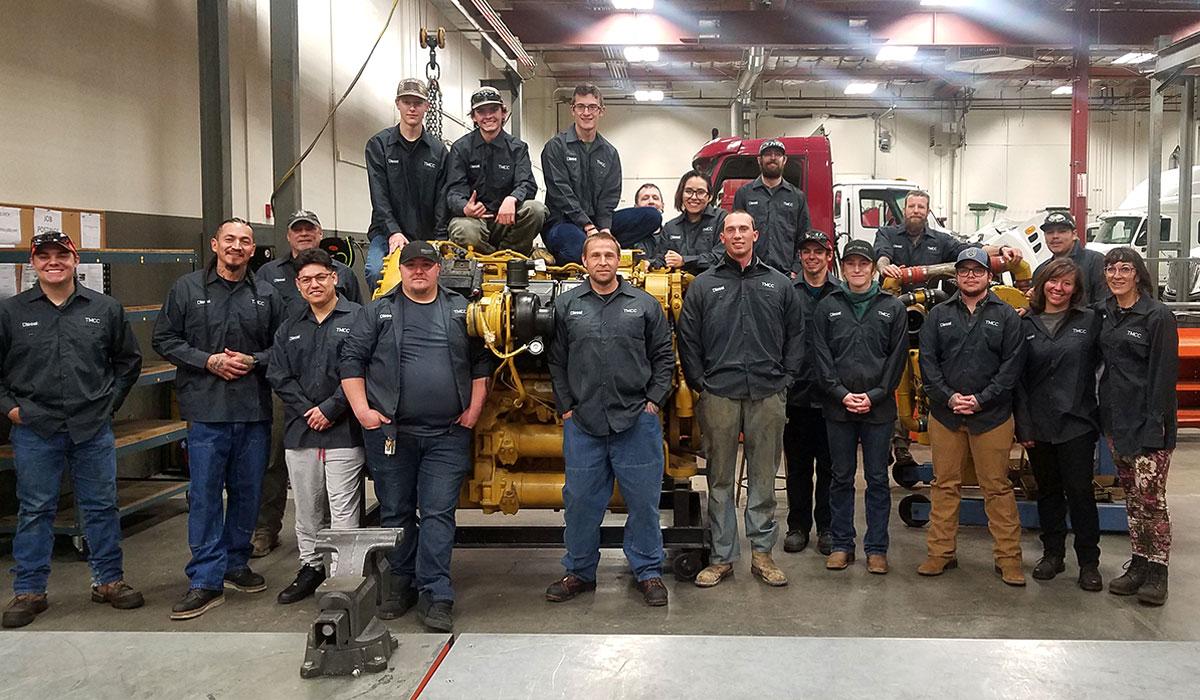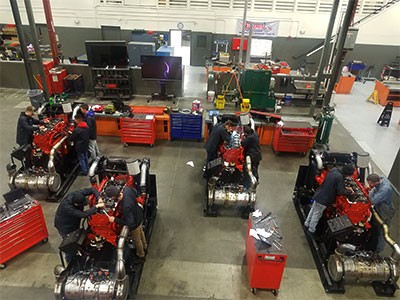
TMCC’s Diesel Program is evolving to establish sustainable practices in the classroom and creating real changes for our planet’s environment. The union between the two just works, and there’s plenty of instances that highlight its improvements. As our Year of Sustainability continues, departments and individuals are taking the big, and little, steps to model our institution into the evergreen superstar we know it is.
Good Design is Sustainable Design
Being environmentally conscious is a passion of ours, and highlighting academic areas that are transforming their curriculum is a prime example of when the rubber meets the road. How will this work? Do students benefit from it? Will these sustainable choices still hold true in the future? Asking yourself the right questions is the first step to take.
One of the approaches faculty use to recreate course content is through its educational resources, and at our William N. Pennington Applied Technology Center, they have this idea at the forefront of their work. Some of the finest original equipment manufacturers in the business such as Cummins, Volvo/Mack, International, Freightliner, and Caterpillar, have offered to impart a bit of their online technician training to be made available for our students. After a year and a half undertaking, the diesel program is proud to announce that for the first time ever, there will not be a textbook in any of their classes.
Kyle Smith, Instructor of Diesel Technology, shared his excitement about the transitions the diesel industry has made to become more sustainable, as well as what students should expect if they pursue a degree in this profession.
“It’s saving students the cost of a textbook. We’re reducing the amount of paper and other materials that are needed for students to haul textbooks around and it’s all gone to open educational resources. I worked for Cummins before I came here. The same training I had access to at Cummins, students have access to here, and we base our curriculum off of those trainings,” said Smith.

Students working on engines at the TMCC William N. Pennington Applied Technology Center.
Developing diesel’s framework is going to be a twofold process, the way Smith sees it. The first are sustainable applications openly connecting TMCC and our students, and the second is of the entire trade, relative to aftertreatment systems and the ecosystem. Aftertreatment systems, or devices that clean exhaust gasses to meet emission standards, have gained a great deal of attention over the years due to their robust capabilities. Tell us, when was the last time you saw noxious fumes coming out of a truck’s stack?
“There is newer technology on the combustion side of the engine itself, and there’s also newer technology on the aftertreatment side. This means that after your diesel is burned, it goes into the exhaust, and then aftertreatment systems will capture parts of the exhaust and hold them. It will also treat gaseous parts of the exhaust, so you get less emissions coming out. With a properly working aftertreatment system, you can actually intake smoggy air, and after it goes through the engine and the combustion process with diesel, it will emit air that is cleaner than the air it took,” said Smith.
Smith discussed the impact mechanics make on the environment, and the natural resources expended from our surroundings. Proper disposal of fluids, oil, and coolant is essential in ensuring the Truckee River stays contaminant free. Both the TMCC diesel and automotive programs have adopted solvent-friendly tanks, indicating they pose no environmental risk when poured down the drain. “The diesel industry has cleaned up their act, now our students need to be able to keep those systems functioning,” said Smith.
The Electric Slide
Advanced technology is making leaps and bounds into the future, and the diesel industry is no stranger to this revolution. Electric vehicles are becoming the face of automotive manufacturers, with regional infrastructures already set in place. Smith explained how battery operated regional trucking has been gaining a lot of traction, enabling medium or heavy duty vehicles to park overnight at their hub in a town, charge up, then get loaded with their product to deliver the next day. With a 150 to 300 mile range, we’re sure to be seeing more and more of that.
“There are companies that are trying to move that to your long haul trucks, where trucks will go city to city and across the country. That is posing much more of a challenge, with being able to charge the batteries or swap the batteries out. There’s a much greater infrastructure needed for that,” said Smith.
So what could be a solution to this long haul trucking dilemma? Diesel electric hybrid vehicles. Now, diesel electric transportation has been around for decades. Trains are the perfect example of this. The engine doesn’t actually drive the train, it activates a power generation unit, and then that power generation unit cycles the electric wheels on the train. The technical knowledge required to convert this design into your everyday vehicle exists, guaranteeing less fuel use and still retaining all the advantages of higher torque electric motors.
“I think that somewhere in the future we will start seeing people interested in diesel electric. Diesel electric is a hybrid vehicle. I would hope we see more interest in that because it’s a sustainable and effective practice without having to invent new infrastructure for long haul battery tending,” said Smith.
As far as sustainability goes, diesel is on the right track. Without straight up replacing the power of diesel, the enterprise has adapted, and is committed to safeguarding the atmosphere for future generations to uphold. It begins in the classroom, and those additional moments you take to help our students learn makes all the difference.
“If you spend a little more time in the beginning, making sure things are right, whether it’s fixing a vehicle so that it’s not going to fail again in a short amount of time or spending a little extra time with a student. Seeing that light bulb come on, it’s great. Seeing the students that myself and the other diesel instructors work with go out and start making a positive change in multiple arenas, I love that,” said Smith.
For more information, please visit the Diesel Program website or call 775-856-5300.